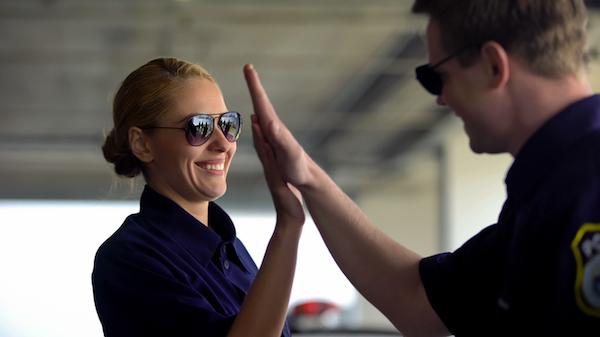
On a scale of 1 to 10, how would you rate your communication skills? By the time they finish their course, graduates from a police foundations course can expect to score 10/10.
Because communication is such an important part of their future work, students will receive hands-on training in Communication Essentials and Basic Business Communications so that they are able to work with colleagues and the public.
Keep reading to find out why communication skills are so important in police foundation careers.
Learn to De-escalate Situations with Police Foundations Training
An important part of police foundation careers is likely to be de-escalating situations and calming people down. This requires incredibly good communication skills. You will need to be able to stay calm even when the situation is heated. You can demonstrate calm by keeping your tone steady and avoiding raising your voice.
Another way to de-escalate heated situations, especially if the other person is emotional or angry, is to empathize. Ask open-ended questions to create a real dialogue, and show that you are trying to help the person. If you demand answers and appear dominating, you will only anger the other person more.
Use Communication Skills to Overcome Language Barriers
Canada is one of the most multicultural countries in the world, and Canadian residents speak a mix of more than 200 different native languages.
This means that at some point in your career, you will need to speak to someone whose first language isn’t English, and make sure you are understood. To get your message across, you will need to speak slowly and clearly, and avoiding using idioms or colloquialisms that might be confusing or misunderstood.
Master Nonverbal Communication
Communication is about much more than just words. It’s all about tone of voice, facial expression, and physical stance. It’s possible to convey a message without saying anything at all.
In a career in police foundations, you may need to learn to communicate empathy and authority without using words, particularly if you’re speaking with someone who doesn’t speak English.
You can do this by keeping a neutral, kind facial expression, eye contact, and keeping your palms open. Simple body language mistakes, like keeping your arms crossed or towering over someone, can be perceived to be aggressive.

Speak to People of All Ages From All Backgrounds
Police foundation training will most likely lead you to a career working with the public. This means you will need to be able to communicate with individuals of all ages and from different backgrounds.
As a result, it’s important to be able to adapt your communication skills to suit your audience. For instance, you wouldn’t speak to a 7-year-old child in the same way that you would speak to a 47-year-old businessperson.
If you need to communicate with a child, it’s a good idea to lower yourself to their level so you can make eye contact, and use simple, straightforward language. And if you’re speaking to someone older, it’s important to show respect both in your choice of words and body language. Modifying your speech and body language to suit who you’re speaking to will make you a better communicator.
Are you interested in finding out more about police foundations courses?
Contact Canadian Business College today!
